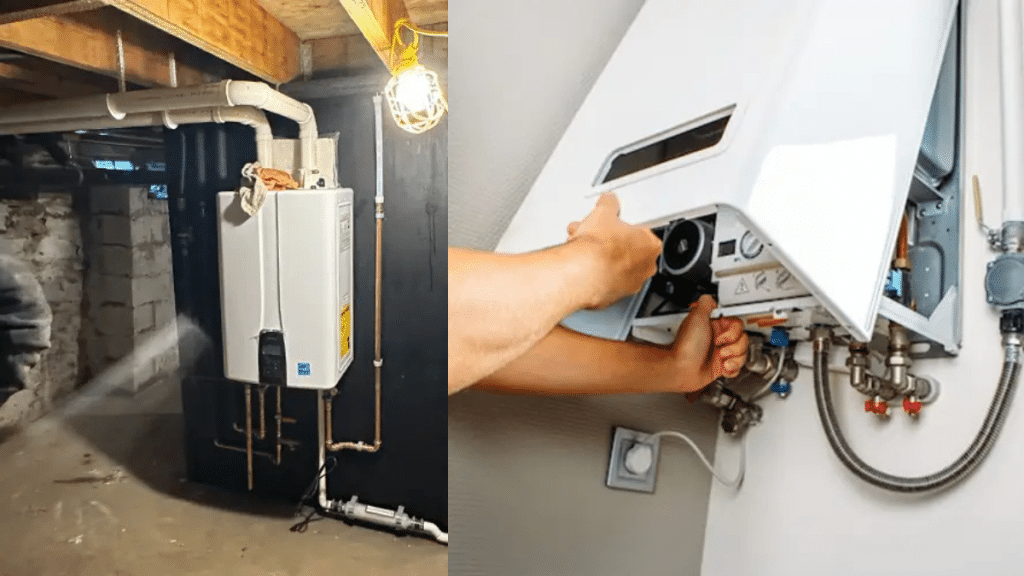Introduction to Tankless Water Heaters
As homeowners seek more intelligent and efficient home systems, tankless water heaters are gaining significant popularity. These on-demand water heaters differ from traditional storage tank units by heating water only when needed, allowing for an endless stream of hot water and dramatically improved energy efficiency. Whether it’s a hot shower, dishwashing, or laundry, there’s no waiting for a tank to refill — the unit instantly heats incoming cold water with a gas burner or electric element whenever you turn on the tap. For homeowners exploring this modern upgrade, consulting with a Navien certified technician ensures proper installation and optimal performance, especially with advanced models from industry-leading brands.
The convenience and reliability of tankless systems are matched by their impressive space-saving design. Unlike bulky storage tanks that can monopolize utility room or garage space, tankless units are compact enough for wall mounting, making them ideal for apartments, small homes, or anyone eager to maximize every square foot. When paired with lower operating costs, these benefits are transforming how many homeowners think about hot water.
Energy Efficiency and Cost Savings
Tankless water heaters offer significant energy savings over their traditional counterparts. Operating only when hot water is in demand, they avoid the standby heat losses that plague tank systems. According to the U.S. Department of Energy, households using 41 gallons or less of hot water daily could reduce energy use by 24%–34% with a tankless model. Even for larger households, savings are substantial, typically falling between 8% and 14%.
Although the upfront investment for a tankless water heater is generally higher due to equipment and installation costs, these expenses are often recouped over time through reduced energy bills and incentives such as rebates or tax credits offered in many regions. This long-term financial benefit, combined with their durability, makes tankless units a wise choice for many homeowners looking for lasting value.
For those living in Fairfield County, consulting a local plumbing expert like a Westport CT plumber is recommended to ensure your household’s specific hot water needs, local codes, and eligibility for energy-saving incentives are fully considered before installation.
Space-Saving Design
The compact nature of tankless water heaters represents a significant advantage for modern homes. Traditional tank systems, which often hold 40 gallons or more, require a large physical footprint and must remain accessible for maintenance or replacement. By contrast, tankless models can usually be installed on a wall—sometimes (depending on the model) even outdoors—reclaiming precious space for storage, laundry, or living purposes.
Continuous Hot Water Supply
One of the main frustrations with traditional tank systems is running out of hot water during peak use. Once the stored hot water is depleted, users must wait for the tank to refill and reheat. In contrast, tankless water heaters never run out, for as long as the incoming water supply flows and the demand is within the system’s rated capacity, hot water is always available. This feature particularly appeals to larger households or families with overlapping water needs, such as simultaneous showers, dishwashing, and laundry.
This continuous hot water supply is only possible because tankless heaters instantly heat water as it passes through the device, rather than storing it. Reliability and consistent performance are the new expectations for modern hot water solutions, and tankless technology meets them head-on.
Longevity and Durability
Tapping into long-term investments is simpler with tankless heaters, which routinely last up to 20 years, five to ten years longer on average than storage tank water heaters. The lack of a tank prevents issues related to corrosion and leaks, helping to boost their lifespan further. Many leading brands back this durability with extensive warranties, providing confidence and peace of mind for homeowners. Routine care, such as descaling in hard water areas, can help maximize your system’s performance and longevity.
Installation Considerations
Installing a tankless water heater is complex and may call for upgrades to your home’s gas supply, ventilation, or electrical system, depending on the model type. Proper sizing matches your household’s water demand with the system’s flow rate capabilities. It is highly recommended to consult a plumbing professional with verified experience in tankless technologies — especially one certified by the manufacturer — to avoid costly errors and ensure efficient water delivery throughout your home.
Secondary Installation Factors
Considerations like local building codes, climate, and the quality of your home’s existing infrastructure all play a role in determining whether a tankless water heater is a good fit. As the New York Times highlights, professional evaluation is essential to help avoid performance issues, compliance problems, and unnecessary expenditures.
Maintenance Requirements
Proper maintenance is the key to unlocking the full potential of your tankless water heater. Manufacturers typically recommend annual or biannual descaling (especially in areas with hard water), occasional filter cleaning, and inspection of crucial components to prevent scale build-up and maintain optimal flow rates. Well-maintained units are less likely to break down and will provide the lasting performance that justifies their initial cost.
Environmental Impact
Tankless water heaters use less energy than tank-style models, resulting in fewer greenhouse gas emissions. This eco-friendly aspect is essential as households look for ways to reduce their carbon footprint. By using only the energy necessary for current demand, tankless technology helps make sustainable living accessible and practical for more families.
Conclusion
Tankless water heaters deliver tangible benefits across energy efficiency, modern convenience, and home value. Though the up-front investment and installation complexity may be higher than with traditional systems, the rewards — from steady utility savings to better use of space and reliable hot water — make them an appealing choice for today’s discerning homeowner. Partnering with a certified technician ensures your tankless system is sized, installed, and maintained correctly for years of comfort and efficiency.
